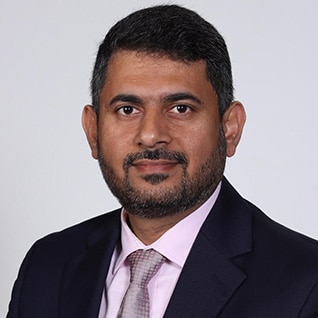Meet Our Fellows
The Pancreatology Fellowship draws trainees from across the U.S. and around the world. While all our fellows have a love of learning and a compassionate approach to patient care, they come from diverse backgrounds, family status, and professional and personal interests.
 Waqas Rasheed, M.B.B.S.
Waqas Rasheed, M.B.B.S.
Medical school: Services Institute of Medical Sciences, Punjab, Pakistan
Residency: Internal Medicine, Texas Tech University at Amarillo
What attracted you to gastroenterology?
While I once considered a career in surgery, I was ultimately inspired by the intellectual challenges and diagnostic reasoning that make internal medicine so rewarding. Gastroenterology offered the perfect blend of both: procedural expertise and intellectual challenge. My decision was also shaped by personal experiences, as several of my family members have struggled with gastrointestinal diseases. What excites me most is the diversity of conditions within gastroenterology, with pancreatology being my primary focus. This subspecialty offers an extraordinary opportunity to advance care through research and innovation, and I aspire to contribute meaningfully to improving outcomes for patients who face these complex diseases.
Why did you choose Mayo Clinic for fellowship training?
I chose Mayo Clinic because of its unparalleled dedication to patient-centered care, innovation, and multidisciplinary collaboration. What impressed me most is the way Mayo creates an environment where patients truly come first and research is seamlessly integrated into everyday practice. Just as important, the fellowship offers outstanding clinical training in a supportive, team-oriented environment, with mentorship from leaders in the field who are genuinely invested in helping fellows grow.
What makes the Mayo Clinic Pancreatology Fellowship unique?
What makes the Mayo Clinic Pancreatology Fellowship truly unique is the way it combines world-class clinical training with unparalleled research opportunities in a collaborative, patient-centered environment. Fellows gain extensive exposure to the full spectrum of pancreatic diseases, ranging from pancreatic cysts and acute or chronic pancreatitis to complex hereditary syndromes and autoimmune pancreatitis. Training under internationally recognized leaders whose work has shaped the field has been transformative, providing both inspiration and mentorship. Equally distinctive is Mayo’s culture, which is defined by teamwork, innovation, and an unwavering commitment to putting the needs of the patient first. This culture creates an environment where fellows can grow into future leaders in pancreatology.
What does your future look like right now?
My future right now is focused on pursuing gastroenterology fellowship training while continuing to grow as a clinician, researcher, and educator. I hope to bring the skills I have developed in pancreatology, research, and patient-centered care into fellowship and beyond. My long-term goal is to build an academic career in gastroenterology with a focus on pancreatology, where I can shape the future of patient care through clinical excellence, discovery, and education.